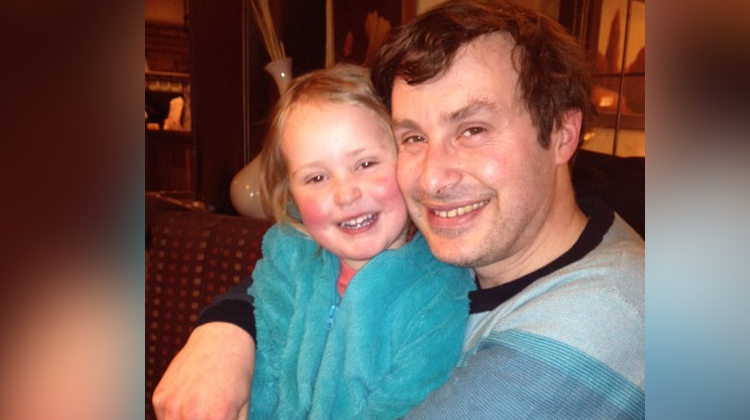‘Another Dad Said That Seeing Isobel…Had Given Them Hope’- Paul on his daughter Isobel

Sitting there cradling in the dark and peering into the unknown, I realise now we were both on the edge in those first months after Isobel was born. But being a Little Hearts dad isn’t all a high wire act; rather it’s punctuated by long spells of normality.
This Father’s Day, I’ve been looking back over the past 4 years.
We were the calmest couple in the hospital the night Isobel was born, almost oblivious as the diagnosis was confirmed. Already in familiar surroundings, we felt safe in the superb care Leeds provides.
She was here and we were a family.
Yet, Isobel has mitral atresia with double outlet right ventricle, which is a variation on hypoplastic left heart syndrome. A few hours after Isobel was born in January 2010, a couple in the neighbouring cot at Leeds LGI observed “she has you round her little finger”. I didn’t believe it then, but I do now. It’s been that way ever since, like 2 peas in a pod. The problem with symbiotic relationships, of course, is that they overpower everything else; more than once my wife has had to point out that she is also here. No one teaches you these things.
Isobel starts school in September, and looking back it is easy to see how I probably overdid things when she was a baby. Some long lost Italian once said ‘carpe diem’ or “seize the day” and that was our way. Feeding tube or not, we were going to meet people. Apparently I used to loom Izzy in people’s faces when we were out, and to their credit no one backed away from this fast flying toddler in my arms. In fact, you often see the best in people when they cotton on that there is more (or rather less) to Isobel than meets the eye. Like Keith and Gillian, our neighbour’s parents who pray for Isobel every night.
Nowadays her friends can outrun her without breaking sweat, and they are too young to look back for their Isobel so there will certainly be difficult times ahead.
Thinking back, though, there have been so many moments of mindless joy. Manic episodes. Whether bouncing or jumping, we excelled ourselves. As a friend consoled me after the diagnosis, “if anything children with disabilities are even more loved”. Who is to tell but it certainly feels that way.
For working parents, it is those critical spells before and after work when you try to be Superdad and the smiles make it all worthwhile. Being a dad brings out qualities you didn’t know you had, but it certainly wears you out and drags out less desirable attributes.
When we decided that we’d take the path less trodden and carry on with the pregnancy, we felt a cloud lift and became parents in a mostly positive state. Dads know the drill, stay strong in hospital, act intelligently around the doctors and consultants and make the nurses laugh. At home it was different. I remember vividly holding Isobel in my lap before her first operation, aged probably a month old. Sensing just how frail she was, I remember thinking that if she died I would need to follow her, to make sure she was ok. Bit by bit those dark thoughts passed and I revelled in what passes for normality. I also realised, literally days ago, that it’s probably important I stick around too if I can.
Another reaction to Isobel’s condition (I hate the term congenital heart disease) is a compulsive urge to document; to stop time. Photographs have become the norm, with sound recordings and terrible, wonky videos, just as Isobel likes them.
Little Heart Matter has been a wonderful resource, always accessible despite being so busy. We have gained so much from the 2 AGMs we’ve made it to. At this years Villa Park event, another dad said that seeing Isobel (then aged 2) at the 2012 AGM had given them hope going forward with their own pregnancy. That sort of comment makes it all worthwhile.
And guess what? We begin another journey in September when Isobel will have a new brother or sister. Happy father’s day to all the Heart Dads, we carry a lot, but we need each other more than we realise.
By Paul Rhodes (written in 2014)